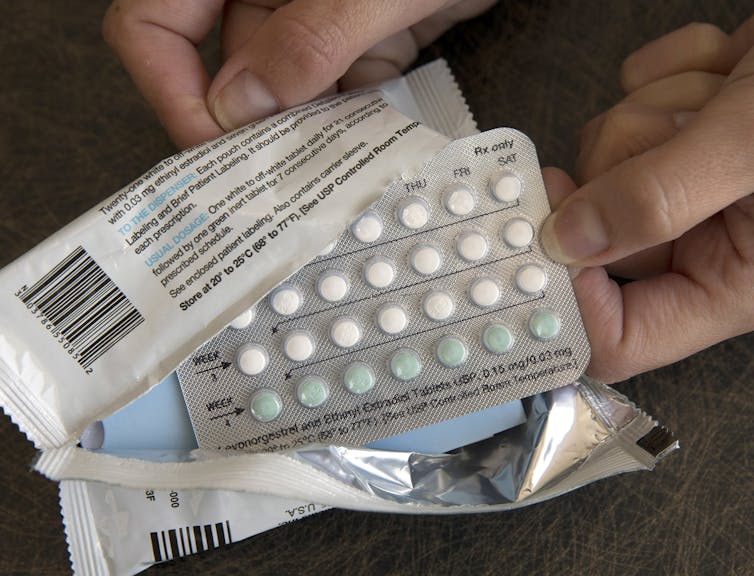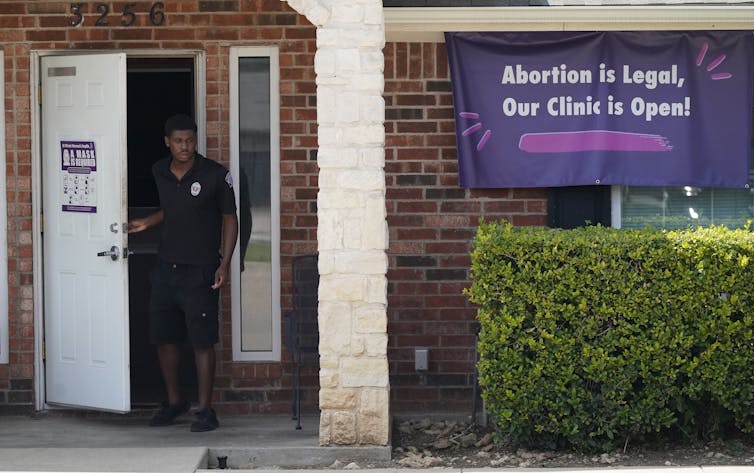By Michele Gilman, University of Baltimore
A leaked draft suggests the Supreme Court is ready to overturn Roe v. Wade, the landmark case that gave women the right to terminate a pregnancy.
But reproductive health isn’t just about abortion, despite all the attention the procedure gets. It’s also about access to family planning services, contraception, sex education and much else – all of which have also come under threat in recent years.
Such access lets women control the timing and size of their families so they have children when they are financially secure and emotionally ready and can finish their education and advance in the workplace. After all, having children is expensive, typically costing almost US$15,000 a year for a middle-class family. For low-income working families, child care costs alone can eat up over a third of earnings.
And that’s why providing Americans with a full range of reproductive health options is good for the economy, at the same time as being essential to the financial security of women and their families. As a law professor who represents people experiencing poverty, I believe doing the opposite threatens not only the physical health of women but their economic well-being too.
The economics of contraception
A Supreme Court majority acknowledged as much in 1992, stating in its Planned Parenthood of Southeastern Pennsylvania v. Casey decision:
“The ability of women to participate equally in the economic and social life of the nation has been facilitated by their ability to control their reproductive lives.”
But in recent years, the right to control their reproductive health has become increasingly illusory for many women, particularly the poor.
Given their focus on limiting access to abortion, you might assume that conservative politicians would be for policies that help women avoid unintended pregnancies. But conservative attacks on birth control are escalating, even though 99% of sexually active women of reproductive age have used some form of it such as an intrauterine device, patch or pill at least once.
In addition to its widely recognized health and autonomy benefits for women, contraception directly boosts the economy. In fact, research shows access to the pill is responsible for a third of women’s wage gains since the 1960s.
And this benefit extends to their kids. Children born to mothers with access to family planning benefit from a 20% to 30% increase in their own incomes over their lifetimes, as well as boosting college completion rates.
Not surprisingly, in a 2016 survey, 80% of women said birth control had a positive effect on their lives, including 63% reporting that it reduces stress and 56% saying it helps them to keep working.

AP Photo/Rich Pedroncelli
Disparities in access
Still, there is a class divide in contraception access, as evidenced by disparities in the 2011 rate of unintended pregnancies – the latest data available.
While the overall rate fell to 45% that year from 51% in 2008, the figure for women living at or below the poverty line, although also decreasing, was five times that of women at the highest income level.
One reason for this disparity is the cost of birth control, particularly for the most effective, long-lasting forms. For instance, it typically costs women over $1,000 for an IUD and the procedure to insert it, amounting to about one month’s full-time pay for a minimum-wage worker lacking insurance coverage.
These costs are significant, given that the average American woman will have about two children and will thus need contraception for at least three decades of her life. Unfortunately, publicly funded family planning meets only 54% of the need, and these funding streams are under constant attack by conservatives.
Not surprisingly, health insurance makes a difference, and women with coverage are much more likely to use contraceptive care. And yet about 6.2 million women who need contraception lack insurance coverage.
Further, this coverage can be denied to millions of employees and their dependents who work for employers claiming a religious or moral objection under a Supreme Court ruling in 2020.
Sex education and the economic ladder
Another key to reproductive health – and one that isn’t discussed enough – is sexual education for teenagers.
For years, the public has spent up to $110 million a year on abstinence-only programs, which not only fail to reduce teen birth rates but also reinforce gender stereotypes and are rife with misinformation. Low-income minority teens are particularly subject to these programs.
Teens without knowledge about their sexual health are more likely to get pregnant and less likely to work, spiraling them to the bottom of the economic ladder.
Access to abortion
Then there’s the issue of abortion. Let’s start with the cost.
Half of women who obtain an abortion pay more than one-third of their monthly income for the procedure.
The longer a woman must wait – either because state law requires it or she needs to save up the money, or both – costs rise significantly.
Studies show that women who cannot access abortion are three times as likely to fall into poverty as women who obtained abortions.
In addition to the financial burden, many states are enacting laws designed to limit abortion access. These laws hit low-income women particularly hard. Since Roe was decided, states have enacted 1,320 restrictions on abortion, including waiting periods, mandatory counseling sessions, and onerous restrictions on clinics. In 2021 alone, states passed 90 such laws.

AP Photo/LM Otero
Hyde and health
Another way in which U.S. policy on abortions exacerbates economic inequality, especially for women of color, is through the ban on federal funding.
It has been so since the 1976 enactment of the Hyde Amendment, which prevents federal Medicaid funds from being used for abortions except in cases of rape or incest, or when the life of the mother is at risk.
Denying poor women coverage for abortion under Medicaid contributes to the unintended birth rates that are seven times as high for poor women as for high-income women.
If Roe v. Wade is overturned by the Supreme Court – the chief justice confirmed the leaked draft’s authenticity but said the decision wasn’t final – poor women would be affected the most. Women who are denied abortions are more likely to end up in poverty, be unemployed and turn to public assistance.
By contrast, economists have established that the legalization of abortion led to improved educational, employment and earnings outcomes for women, as well as for their children.
Politicians cannot promise to grow the economy and simultaneously limit access to abortion, birth control and sexual education. America’s economic health and women’s reproductive health are linked.
This article was updated on May 4, 2022, to add a reference to the leaked draft of the upcoming Supreme Court ruling. It’s a revised version of an article originally published on April 27, 2016.
Michele Gilman, Venable Professor of Law, University of Baltimore
This article is republished from The Conversation under a Creative Commons license. Read the original article.



